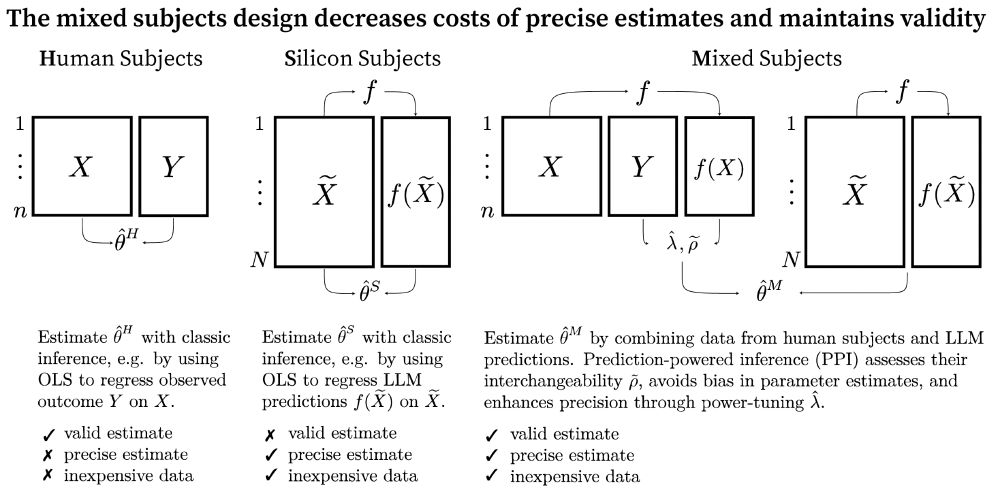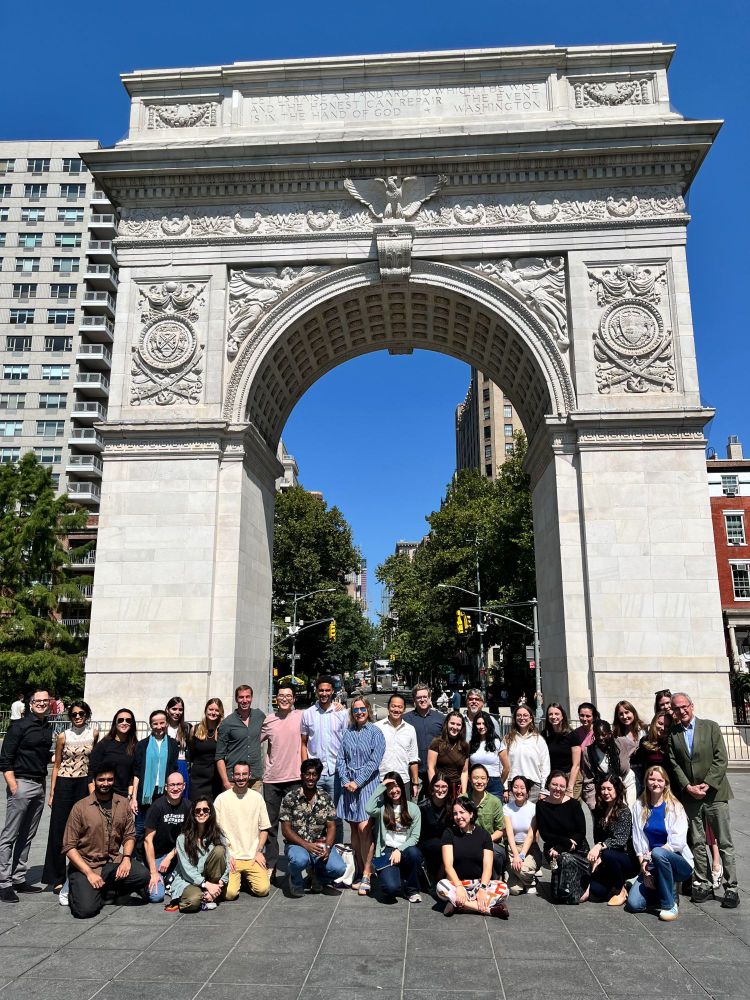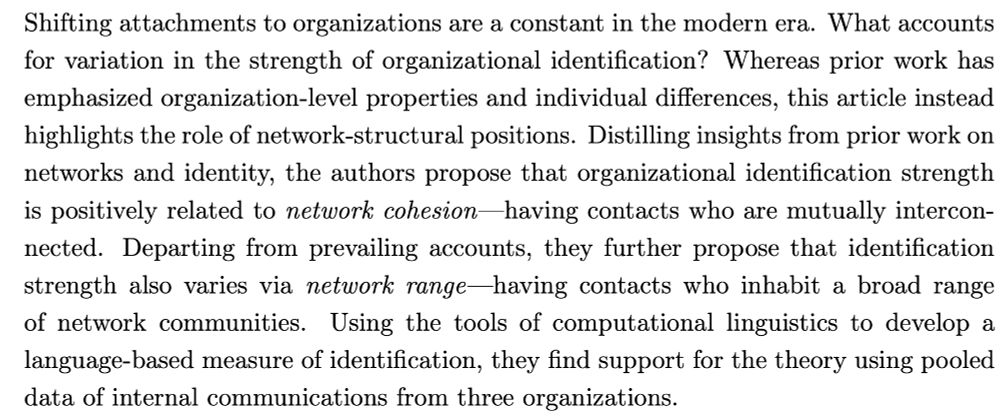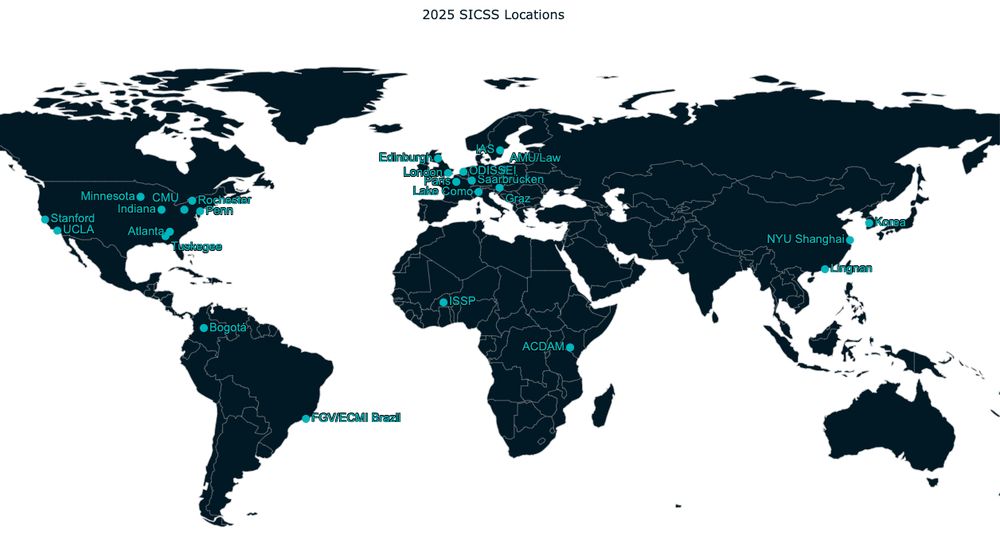Sage Journals: Discover world-class research
Subscription and open access journals from Sage, the world's leading independent academic publisher.
Excited to continue learning about the latest #CSS at @ic2s2.bsky.social! I’ll be at the Social Prediction Session, presenting the mixed subjects design on combining human and LLM data in experiments. Paper with Michael Howes and @austin-van-loon.bsky.social. Come join us! doi.org/10.1177/0049...
21.07.2025 07:29 — 👍 4 🔁 1 💬 0 📌 0

New in Sociological Methods & Research: Soc PhD candidate @davidbroska.bsky.social, @austin-van-loon.bsky.social, & Michael Howes show how combining human subjects and large language models can yield precise estimates at low cost, with implications for scientific productivity
doi.org/10.1177/0049...
25.06.2025 15:32 — 👍 2 🔁 2 💬 0 📌 0

Looking forward to presenting my Class Gap work at the RNIM Online Seminar on Zoom this Friday!
Anyone can register to attend here: sites.google.com/view/rnim-se...
17.06.2025 21:06 — 👍 39 🔁 10 💬 2 📌 4
“…the mixed [subjects] design… is the most reasonable approach I’ve seen in the LLMs for social science literature for integrating LLM simulations into confirmatory-style experiments…”
Also provides thoughtful reflections on the limitations of the approach!
13.06.2025 10:20 — 👍 2 🔁 0 💬 1 📌 0

NYU Social Psychology is looking for people passing through NYC next year who want to give a research TALK in our Speaker Series.
We welcome self-nominations and scholars from all career stages (you can apply multiple times).
Apply here: docs.google.com/forms/d/e/1F...
22.04.2025 22:03 — 👍 37 🔁 16 💬 0 📌 0

Mixed feelings about silicon subjects (LLM predictions of human behavior) as replacements for human subjects? Consider the mixed subjects design.
🚨Now published at Sociological Methods and Research🚨
doi.org/10.1177/0049...
23.04.2025 03:44 — 👍 4 🔁 1 💬 0 📌 0

New from Microsoft Research & Harvard Business School colleagues
"Shifting Work Patterns with Generative AI" by Eleanor Wiske Dillon, Sonia Jaffe, Nicole Immorlica, Christopher T. Stanton
arxiv.org/abs/2504.11436
19.04.2025 22:13 — 👍 32 🔁 9 💬 1 📌 1
I’ve never felt so seen 🥹
19.04.2025 11:08 — 👍 1 🔁 0 💬 1 📌 0

New paper from the computational culture lab, forthcoming @amjsoc.bsky.social!
Building on (largely untested) sociological intuitions, we show how positions in the organizational network relate to identification with the organization, using a language model:
www.journals.uchicago.edu/doi/abs/10.1...
03.03.2025 17:47 — 👍 19 🔁 7 💬 1 📌 0

Want to learn about computational social science *for free* and launch interdisciplinary research projects? We are so excited to announce there will be *26* Summer Institutes in Computational Social Science this year! Apply to one of them here: sicss.io/locations
24.02.2025 14:27 — 👍 145 🔁 91 💬 3 📌 15
Our paper is out today in @pnas.org! 🎉 In a large-scale experiment on a YouTube-like platform, we find that giving people politically “slanted” video recs doesn’t shift beliefs or viewing behaviors.
In other words, online filter bubbles may not be as polarizing as we think…
19.02.2025 16:07 — 👍 12 🔁 4 💬 1 📌 1
Thank you @davidbroska.bsky.social and Michael for your leadership on this paper. It’s been a joy working with you both. Onwards to more breakthroughs in computational social science!
18.02.2025 11:55 — 👍 0 🔁 0 💬 0 📌 0
💡 LLMs aren’t going anywhere. As social scientists, we can either ignore them or work to integrate them rigorously into the research process. We hope this is a step in the right direction—leveraging what LLMs can tell us about human behavior while preserving scientific rigor.
18.02.2025 11:55 — 👍 0 🔁 0 💬 1 📌 0
But wait, there’s more! Since many social scientists are new to PPI, we built tools—like a PPI power analysis. With an estimated treatment effect and assumed interchangeability, our tool optimizes budget allocation between expensive human data and possibly biased LLM responses (!!)
18.02.2025 11:55 — 👍 0 🔁 0 💬 1 📌 0
3️⃣ The more informative LLM behavior is about human behavior, the more we learn from the silicon data—and the more precise the estimate becomes. As models and prompting improve in the future, the estimate ✨automagically✨ adjusts!
18.02.2025 11:55 — 👍 0 🔁 0 💬 1 📌 0
Key properties of this estimator:
1️⃣ It adjusts for silicon bias—if your human-only estimate is unbiased, so is this estimate.
2️⃣ If LLM data adds no info, the mixed estimate is as precise as the human-only one.
18.02.2025 11:55 — 👍 0 🔁 0 💬 1 📌 0
How does it work? We collect a small set of LLM responses that “match” gold-standard human data (think silicon twins). Leveraging prediction-powered inference, we use these to estimate and correct for biases in the LLM, then combine with more LLM data. More details in the paper!
18.02.2025 11:55 — 👍 0 🔁 0 💬 1 📌 0
What if you didn’t need the interchangeability assumption? My coauthors (David Broska and Michael Howes) and I propose a “mixed‐subjects” approach: collecting human and silicon data together to produce estimates about humans that are unbiased and more precise. 🙂➕🤖
18.02.2025 11:55 — 👍 0 🔁 0 💬 1 📌 0
However, silicon sampling today often relies on an untested interchangeability assumption—that LLMs act like humans (at least on average). But, we a TON of evidence now that LLMs misrepresent human behavior/opinions in all kinds of ways. There’s good reason to be skeptical. 🤔
18.02.2025 11:55 — 👍 1 🔁 0 💬 1 📌 0
If effective, silicon sampling could make social science more efficient, safe, and equitable. Clearly LLMs contain a lot of information about us—it would be foolish (and irresponsible) to just ignore it.
18.02.2025 11:55 — 👍 1 🔁 0 💬 1 📌 0
Since the generative AI boom, researchers have flirted with “silicon sampling”—using LLMs to simulate human subjects. For instance, ask an LLM how it’d answer survey questions after experiencing an experimental stimulus, then treat its responses as data.
18.02.2025 11:55 — 👍 0 🔁 0 💬 1 📌 0
OSF
🚨 ACCEPTED AT SMR 🚨
Confused by colleagues who seem to want to study LLMs instead of humans? Frustrated by skeptics (e.g., myself 8 months ago) who dismiss LLMs as a potential source of data on human behavior? Check out our paper for a new way forward: osf.io/j3bnt_v3/
18.02.2025 11:55 — 👍 4 🔁 2 💬 1 📌 0
Apply - Interfolio
{{$ctrl.$state.data.pageTitle}} - Apply - Interfolio
I am hiring a predoc at MIT to start this summer!
We will work on various topics in labor economics - unions, minimum wages, imperfect competition, etc.
Please apply and share !
#predoc @mitiwer.bsky.social #EconSky
apply.interfolio.com/163492
14.02.2025 16:41 — 👍 72 🔁 41 💬 3 📌 2

The Department of Social Science at the University of New Brunswick in Saint John invites applications for a tenure track position in Sociology. This position is at the rank of Assistant Professor and is housed within an interdisciplinary department that includes Social Work, Sociology, Communication Studies and Education. The Department of Social Science offers major, double-major, minor, specializations, and honours programmes in Sociology. The position will commence as of July 1, 2025 and is subject to budgetary approval.
The discipline is seeking a scholar with demonstrated expertise in quantitative methods. The discipline is especially interested in candidates whose research program also engages with one or more of the following topics: immigration and migration, global determinants of health and well-being, mental health and addictions, and social policy. Candidates will be expected to teach at both the introductory and advanced levels and to work with graduate and honours students. Course assignments will include a core course in quantitative methods. Candidates should have a Ph.D in Sociology or cognate discipline or be near completion. Candidates with a Ph.D. nearing completion will be considered for appointment as Lecturer.
Applicants are requested to submit electronically (as a single PDF) a curriculum vitae, statement of their research interests, and a teaching dossier (that includes evidence of teaching competence, as indicated by teaching evaluations, testimonials from individuals familiar with the candidate's capabilities) to socsci@unb.ca
Applicants should arrange for 3 reference letters to be sent by referees directly to socsci@unb.ca. Questions concerning this position may be directed to the department chair, June M. Madeley at jmadeley@unb.ca
UNB's St. John campus is hiring a TT position in Sociology with an emphasis on quantitative methods. Although there are rules about prioritizing Canadian candidates, I would encourage US folks to apply.
universityaffairs.ca/search-job/?...
07.02.2025 15:45 — 👍 55 🔁 35 💬 2 📌 1
The sun has fallen down
And the billboards are all leering
And the flags are all dead at the tops of their poles
He/هو/any. Our views and typos aren’t even our own. Fuck cancer.
Asst Prof of Sociology @ uwsoc.bsky.social | Interests: happiness; inequality; social psych; genomics; open science | www.tamkinatrauf.com
Sociology PhD student. I study segregation, climate events, and schools.
https://tylermcdaniel.github.io/
Official Bluesky account of the Department of Sociology at Stanford University.
Media scholar | Assistant Professor of Political Science @Columbia | Author of The American Mirage (PUP 2025) | Host of Media Effects Empricial Workshop (MEEW)
Assistant Prof. in Org. Behavior @StanfordGSB | Computational Culture Lab http://comp-culture.org | Social Networks, Cognition, Cultural Evolution, AI
I study immigrants in the US. Passionate about research, policy, language & lipstick. Assistant Professor at Cal Poly. Mujerista.(She/Ella)
Husband, dad, veteran, writer, and proud Midwesterner. 19th US Secretary of Transportation and former Mayor of South Bend.
Sociologist @ Duke. It’s pronounced like Farrell, not like Carell.
ashleylharrell.com
Assistant professor at the University of Toronto and faculty affiliate at PASCL-Stanford. (Almost done) writing a book about how institutions can shape intergroup relations in conflict-ridden societies.
www.chagaiweiss.com
Behavioral Scientist.
Lately, I've been thinking (and posting) about: AI+Psych, Personal Finance, Consumer Behavior. Civically engaged, so I occasionally post about that too.
Assistant Professor of Sociology at Northwestern
Culture, political sociology, NLP, social networks, computational social science
oscarstuhler.org
🇪🇺 PhD Candidate at Stanford Sociology. Computational Social Science, Social Psychology, and Social Policy
https://sociology.stanford.edu/people/david-sebastian-broska
News from a West Coast perspective.
Read more at www.latimes.com.
Since 1889 🗞️
Sign up for our newsletters and alerts: http://wsj.com/newsletters
Got a tip? http://wsj.com/tips
Follow our staff: https://go.bsky.app/2ppWqxF
This is the official Bluesky account for MIT. We are currently not active on this platform.
New England's leading source for breaking news and analysis.
bostonglobe.com
Official Bluesky account of the Boston Parks and Recreation Department. Clean, green, safe & accessible open space for all Bostonians!
linktr.ee/bostonparksdept
Official Bluesky account of the Boston Public Health Commission. Committed to building a healthy Boston. Follow for news and information.
Learn more at boston.gov/bphc.
Official Bluesky account of the City of Boston Streets Cabinet (Transportation & Public Works). Helping make Boston’s streets work for everyone, no matter who you are or how you get around. 🏃🏽♀️🚲👟🚍🚦🗑♻️
linktr.ee/bosstreets







